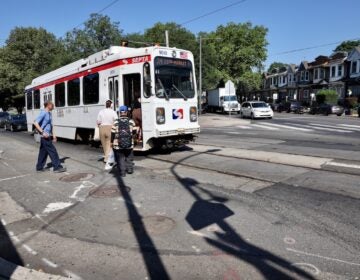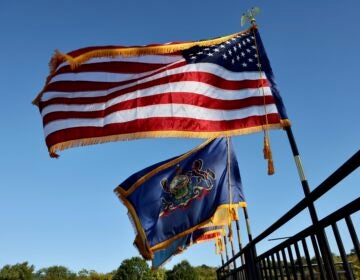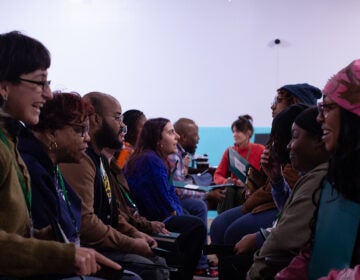Is it possible to change what a historic site means?
The historic Cliveden house in Philadelphia will officially unveil its new campaign to redefine how the public views it. NewsWorks presents this essay from the executive director of Cliveden, David Young, to explain this effort.
Is it possible to change what a historic site means? At Cliveden this Independence Day we do just that. All Americans celebrate the Declaration of Independence and the words “all men are created equal,” although they did not apply to all Americans for generations. At Cliveden one can consider our nation’s accomplishments with the celebrations of African American achievements. Cliveden’s new exhibition, “Life, Liberty & the Pursuit of Happiness?” asserts that the memory of nation’s struggle for independence is just as important as the memory of African American struggle for freedom.
Like most historic sites in Germantown, Cliveden has commemorated Colonial and Revolutionary heritage. Given the neighborhood’s important political, economic, and cultural connections to the founding of America, that is appropriate. For instance, Cliveden, Johnson House, Stenton, Hood Cemetery and Concord Schoolhouse celebrate July 4th because these places stood here on the day the Declaration of Independence was signed in Philadelphia; they remain preserved so we can make sense of that document in our lives today.
Cliveden’s beginnings
Built in 1767 as a home for the wealthy family of politically prominent attorney Benjamin Chew, Cliveden was the scene of the bloody Battle of Germantown in 1777. The beautiful stone house still bears the marks from the Battle, which was the Continental Army’s first planned attack on the British, who occupied Philadelphia. For most of its history, Cliveden has been preserved as a shrine to its role in the founding of America.
The Battle of Germantown, however, was just a few hours in the 245-year history of Cliveden. This July Fourth, Cliveden presents a fuller picture of Cliveden through all the diverse stories it has to tell in its entire history. The program, True to Our Native Land, will introduce new exhibitions that give voice to the many stories of American Americans involved in the world of the Chews.
Slavery in America
In addition to holding important legal offices in Pennsylvania, Benjamin Chew was a wealthy slave owner who, along with his brother, owned as many as 9 plantations in Delaware and Maryland with hundreds of people enslaved as late as the 1830s. While Cliveden is not a plantation, its many servants included indentured and enslaved Africans working at the site or in the home taking care of the Chew children. The history of enslavement in Philadelphia is an important, yet undertold, chapter in our city’s heritage. Using research from the Chew Papers, Cliveden’s new exhibition and house tours change that.
A site with difficult history like slavery and oppression can make folks uncomfortable, but Cliveden’s community includes people interested in telling the truth. The tone was set by Cliveden board member John Chew, “If this happened, we have to tell it.” To tell what we know about the Chews’ wealth and their role in the Mid-Atlantic slave economy, Cliveden worked with a lot of people over several years.
Family papers examined
The Chew Family papers were found in Cliveden and turned over to the Historical Society of Pennsylvania in 1982, which owns all 230,000 of them. They are not located at Cliveden except as features in the exhibitions opening on July 4. Cliveden has been researching the Chew family papers related to slavery since 1994. As more of the Chew papers became accessible at the Historical Society, Cliveden staff and other scholars discovered the extent of the Chew plantations and the people who worked there under harsh and violent conditions.
Cliveden’s planning involved scholars, Chews, community members, teachers, storytellers, and reparationists working with Cliveden’s board and staff. A series of engagement meetings and public conversations put the research of the Chew papers into wider contexts. The “Cliveden Conversations” emphasized a safe, respectful way to discuss race, history and memory in America (a new series will convene in August 9 at Cliveden). Over 150 people took part, emphasizing how history can stimulate and promote dialogue. The project became bigger than any one family, group, person, or organization. What had been a shrine to the Revolution became a forum for discussion in which all voices were heard.
July 4, 2012
These discussions produced exhibitions that open on July 4. A multimedia presentation by Teamwork Productions, “Emancipating Cliveden”, showcases the process of people coming together to discuss contradictions in American history. It features voices from the Chew papers, of people like Charity Castle and Will, who escaped to the British during the Revolution rather than be a slave to Benjamin Chew. “Life, Liberty & the Pursuit of Happiness?” showcases the documents in ways that highlight questions about how liberty and independence have co-existed with discrimination and racism. The exhibition features a unique timeline of Germantown’s African American history—with many paradoxes in how we remember our community’s great history. Cliveden looks very different when one considers all the diverse perspectives involved in what the site means today.
At Cliveden, know history, feel its power, and share it with others. The more we find about the places like Cliveden, the more exciting they become.
• True to Our Native Land: a celebration of race, place, and memory at Cliveden. Noon to 4:00pm. Wednesday, July 4, 2012. www.cliveden.org. Part of Historic Germantown’s Independence Day celebrations www.freedomsbackyard.com.
• Our 4th series of Cliveden Conversations series beginning August 9 featuring New Stories from the Chew Papers by Griot storyteller Denise Valentine at 7 p.m. in the Cliveden Carriage House.
• The August 23 Cliveden Conversations program will feature a discussion about Germantown’s 7 National Historic Landmarks and the National Park Service goal to update NHLs to reflect diverse history and significance. This program will feature Bill Bolger of the NPS as well as graduate students of the University of Michigan Public History Center, who are re-writing Cliveden’s National Historic Landmark nomination to reflect the site’s broader history, including the Battle of Germantown and the Chew family’s connection to Philadelphia’s slave economy.
• Orientation Exhibition, Life, Liberty & Pursuit of Happiness featuring documents and photos reproduced for easy reading of powerful tales of enslavement, perseverance, and preservation.
• Orientation video, Emancipating Cliveden, by Bob Lott and Teamwork Productions, including voiceovers by the late Dr. Ed Robinson, Sam and John Chew, Kenny Gamble, Patty Jackson, Arthur Fennell, and many others.
• A visitor experience rooted in having people embrace, and question, profiles of individuals with a signifying silhouette: Will, Charity Castle, James Smith, Benjamin Chew, Mary Sands Brown Chew, and Hannah Welch. (see pdf)
David W. Young is the executive director of Cliveden, 6401 Germantown Ave.
WHYY is your source for fact-based, in-depth journalism and information. As a nonprofit organization, we rely on financial support from readers like you. Please give today.




